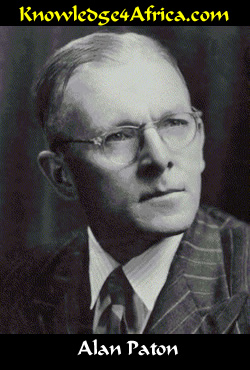|
READ THIS
The poet reflects on the giving of an insignificant item of clothing, unwanted by the owner, to the family's
Black domestic worker. He is humbled by her excitement and appreciation for something that seemed
to him so trivial.
The poem is an indictment against the treatment and status of Black people in the South Africa of the
poet's day.
 ABOUT THE POET
ABOUT THE POET
Allan Paton was born in Pietermaritzburg (South Africa) in 1903. He started his career as a teacher but
soon took a strong interest in race relations, joining the South African Institute of Race Relations in 1930.
In 1935 Paton left teaching to become principal of Diepkloof Reformatory for urban Black boys. There he
introduced many humane reforms.
He first achieved fame for his novel, Cry the Beloved Country which was published in 1948. The
story exposed race relations in South Africa of that era.
Merely a few months after the publication of the novel, the National Party came into power in South Africa
and the system of social engineering called Apartheid was born.
Paton then became more involved in politics, becoming National President of the Liberal Party.
In 1964, he gave evidence in mitigation of sentence at Nelson Mandela's treason trial.
Paton died in April 1988 at the age of 85.
Have you looked at the questions
in the right column?
|
TEST YOURSELF!
Read the left column and then answer
the following questions:
"The Discardment"
- What are the connotations of the title of this poem? (2)

[Need help?]
A "discardment" is an item which is unwanted and which the owner is ready to throw out, to dispose
of or to get rid of. The owner no longer has any use for it.
Instead of throwing it away, however, the Paton family decided to give it to their Black domestic worker.
Since it was something for which the owner had absolutely no use, it was hardly suitable as a gift -- and
yet this was clearly what the woman regarded it to be.
This emphasised the great divide between Whites and Blacks in South Africa in the poet's day, the great
divide between the haves and the have-nots.
The Whites in the poet's day were a privileged group, while the Black people generally were the
disadvantaged who become ecstatic at being on the receiving end even of an unwanted, apparently
useless item.
|
"We gave her a discardment
A trifle, a thing no longer to be worn,
Its purpose served, its life done."
- Identify five words from the poem which clearly convey the woman's excitement at receiving the
discarded item. (5)

[Need help?]
Look at the following words which reveal excitement: "exclamations"; "shone";
"called"; "cried"; "pirouetted"; "danced"; "mimed"; "sang";
"blessings"; "intolerable joy".
|
- To whom do "we" and "her" refer? Quote from the poem to justify your
answer. (3)

[Need help?]
The words refer to the White family and to the family's Black domestic servant.
"her fellow servants".
|
- The poet used repetition in these three lines. What was his intention? (3)

[Need help?]
The poet constantly qualified the meaning and connotation of a "discardment". He emphasised
and made it clear how trivial, unwanted and insignificant this item was.
In fact, he never even mentioned what it was! The item was not important to him. The mere fact that they
thought of giving it to their domestic worker, however, was all that was important to her.
The actual item itself was not important. It simply served to prove to her and to those to whom she
showed it, that she was important in the family's life.
|
" to participate
In this intolerable joy."

[Need help?]
An OXYMORON is a combination of contradictory words set side by side, e.g. an open secret. The
purpose of the contradiction is to emphasise the point or idea.
|
- Explain why the above quotation is an example of an oxymoron. (3)

[Need help?]
If something is intolerable, it is unbearable. One does not want to have to put up with it or deal with it.
One wants to dispose of it as quickly as possible.
Joy, on the other hand, is something one wishes to prolong. It is implies happiness / ecstasy.
The woman's joy was so abundant and overwhelming, however, that she could hardly bear it. This is an
apparent contradiction.
|
"And so for nothing
Is purchased loyalty and trust
And the unquestioning obedience
of the earth's most rare simplicity."
- Explain the poet's use of an OXYMORON in "rare simplicity". (4)

[Need help?]
Something which is "rare" is unusual and unlike anything else which exists. It has aspects which
distinguish it and set it apart.
If an item is characterised by its "simplicity", on the other hand, it has no aspects which distinguish
it from other items.
"Simplicity" implies that there is nothing out of the ordinary about the item; the item is run-of-the-
mill; there is nothing extraordinary which sets it apart from other items. There is nothing to make it stand
out and be regarded as "rare".
"Rare" and "simplicity" are therefore opposites.
|
- What is meant by HYPERBOLE? (2)

[Need help?]
Hyperbole is a deliberate exaggeration in order to emphasise a point.
|
- Quote an example of hyperbole from the poem. Justify why your choice is an example of
hyperbole. (5)

[Need help?]
"To all the continent of Africa".
In order to highlight the domestic worker's excitement, the poet emphasised the number of people to
whom she showed the item.
She was unable to contain herself. She was so ecstatic that she showed the item to as many people as
she possibly could. She wanted them all to share in her excitement.
The poet therefore exaggerates to underline his point: she showed it to "all the continent of Africa".
|
|



